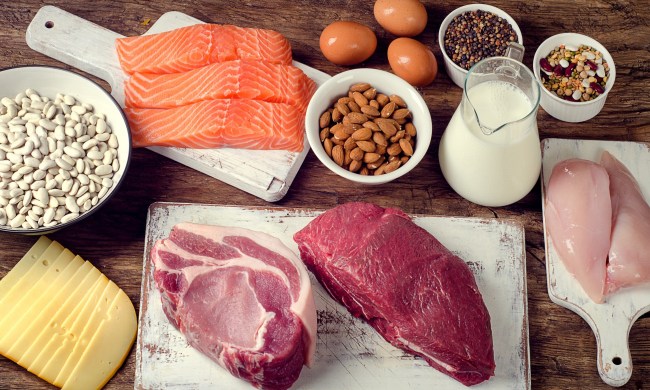
Sulfur is a major element found predominantly in the soil where food is grown. The word sulfur might make you think about certain foods like broccoli and black beans and that distinctive scent when cooking sulfur-rich veggies. This makes sense, considering sulfur is essential to a balanced diet. You might be wondering what sulfur is used for in your body, what the benefits are, and what foods are high in sulfur. The more you know, the more reasons you have to consume sulfur-packed whole foods as part of a well-formulated healthy diet.

What is sulfur?
Sulfur is a nonmetallic chemical element that your body can’t make, so it is sourced entirely from your diet, including from plant and animal sources.
Like calcium and phosphorus, sulfur is an abundant natural mineral found in soil and in plenty of foods, from broccoli to beef and beyond. Drinking water from certain sources also can contain sulfur. Some medications, supplements, joint pain remedies, antibiotics, and analgesics also contain varying degrees of this important mineral.

What are the benefits of sulfur?
Garlic, cauliflower, and other cruciferous vegetables high in sulfur may help protect against diseases like heart disease, cancer, and degenerating brain function. Consuming sulfur in your diet brings a whole host of benefits, including:
- Helping you metabolize food
- Protecting your body from oxidative stress and inflammation
- Playing a role in gene expression, making protein, and building and repairing DNA
- Maintaining the integrity of connective tissues, such as tendons, skin, and ligaments
This understated nutrient has antimicrobial, anti-inflammatory, and antioxidant effects. Sulfur is also crucial for making and recycling glutathione — your body’s primary antioxidant that reduces inflammation and combats oxidative stress.

What does sulfur do to your body?
Compounds containing sulfur are called organosulfur compounds and are found in numerous foods. Sulfur has several functions in the human body, from synthesizing antioxidants and maintaining nitrogen balance to building and repairing DNA and inhibiting harmful bacteria. These processes and your health will suffer if you aren’t eating enough of this mineral. For example, low glutathione antioxidant levels are associated with weaker immune function. The sulfur you eat is integral to your body’s ability to make protective glutathione.
Is sulfur good for your gut?
Sulfur is good for your gut because it assists cell regeneration in the gut lining. A damaged and dysfunctional gut lining can allow food particles to ‘leak’ into the bloodstream, stimulating an immune response and inflammation. Beyond this, sulfur lowers inflammation in the intestines, which could help to ease symptoms of IBS and digestive orders.
The lining of the intestines is made of collagen — the most abundant protein in your body. The sulfur mineral assists in forming the scaffolding for collagen.
Sulfur could also benefit the microbiome — the vast ecosystem of bacteria and microbes in your digestive system. More studies are needed, specifically on how sulfur impacts digestive disorders.

How much sulfur do you need a day?
Most people get enough sulfur from their diets because it’s found in popular foods like meat, broccoli, and beans. Folks eating primarily whole foods should have plenty of sulfur, although the standard American diet is loaded with processed carbohydrates that are deficient in sulfur. Vegetables today also don’t have as much sulfur as they once did.
The National Academies Food and Nutrition Board recommends consuming around 0.2 to 3 grams daily to meet your body’s needs. Some people might feel better consuming more sulfur than others, and some people take sulfur supplements to help with arthritis and for other health reasons.
If you have questions about sulfur in your diet or sulfur supplements, it’s best to visit your healthcare provider.
Is it possible to get too much sulfur?
While getting enough sulfur is crucial for your health, it’s also possible to get too much. For example, drinking water with high levels of sulfur can cause unpleasant side effects like indigestion and diarrhea. Water levels in sulfur can be tested with sulfur sticks. No solid evidence indicates that ingesting large amounts of sulfur from food has the same effects as drinking high-sulfur water.
More research is needed on sulfur sensitivity, but certain people report feeling better on a diet lower in sulfur. Most studies to date are focused on sulfites, a preservative made from sulfur that’s often added to packaged foods and alcoholic beverages to extend shelf life. A small number of people have a sulfite sensitivity, and they can experience asthma-like symptoms, hives, itching, and more after eating foods high in sulfites. In more severe cases, sulfite exposure could result in anaphylactic shock.
Those with sulfite sensitivity are advised to check labels and avoid ingredients like sodium bisulfite, sodium sulfite, and potassium bisulfite. The sulfite preservative and the sulfur mineral found in whole foods are different. No evidence supports that people sensitive to sulfites also benefit from avoiding sulfur in natural foods.

Which foods are high in sulfur?
Plenty of natural and delicious foods are high in sulfur, including:
- Meat, especially beef
- Fish and seafood, including shrimp and scallops
- Beans and legumes, especially soybeans and black beans
- Nuts and seeds
- Eggs and dairy
- Certain vegetables, such as asparagus, cabbage, onion, and broccoli
- Leafy greens
- Certain grains, such as pearl barley, wheat, and oats
The most sulfur-dense foods are cruciferous and allium vegetables, animal protein, dairy, beans, nuts, and seeds. You can cook up plenty of tasty sulfur-rich meals. Since it plays a role in building and repairing DNA, you could say the sulfur mineral is part of what makes you you and makes you human.



